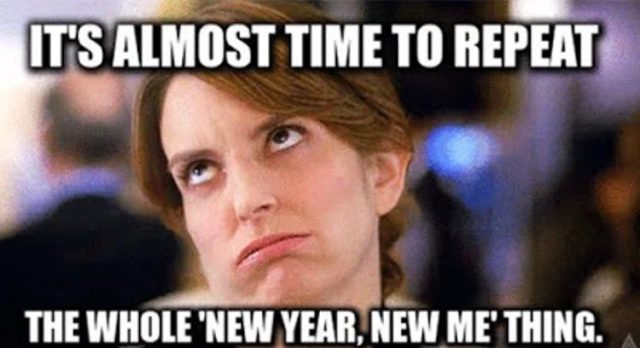Do you set resolutions every year?
Me in December:
Lookout, new year, I’m about to own you.
I’m going to do me better than ever before.
I’m going to wake up an hour earlier every morning to yoga and meditate and write in my gratitude journal. I’m going to run a marathon. I’m going to eat healthier, cut out the sugar, quit coffee, drink less, smile more…
I’m going to smash my career goals. Heck, I’m going to achieve all the goals.. I’m going to follow my big dreams.
I can do this. I’ve got this. I’m so inspired. It’s going to be a new year, a fresh start.
Nothing can stop me.
Ooh ooh, I know! I’ll write down my intentions, pay homage to the moon with a little dance and a chant, burn a sage stick, and release all the crap that held me back in 2019.
So long, crap! Good riddance. Adios. Sayonara.
Me in January:
How did you get in my hand, you saucy double pizza slice with extra everything?

Who do so many of us quit our resolutions?
How can this be? In less than one month, all my intentions have vanished out the window. I mean, come on, I chanted to the moon, for goodness sake.
This happens to me every year. I only have to ask a handful of friends who also made resolutions, and most of them will say the same thing. They’ll start slipping back into old habits by late January. Some get through January only to find themselves falling off the wagon by February, March or April.
The fact is, for a lot of people, resolutions don’t last. I wanted to know why, so I did some digging. Why does this happen? Why is it that resolutions lose their schtick in as little as one month?
4 tips for setting and achieving your goals in 2020
Active social network, Strava, mark January 19th as “quitter’s day”, a term they coined to highlight the highest drop in exercise-related revolutions every year. They attribute the decline in numbers to not having enough of a support network.
“Our studies show that people keep people active – find a friend or join a club to help keep you motivated.”
Psychology Today, who cited less than 10 percent of us stick to our resolutions, present scientific studies,which show habits and our self-story are the precurser to smart goal setting and long term goal success.
Swapping old for new
You have to swap out an old habit directly for a new one. The most effective way to do this is to break one resolution into smaller chunks. If one of your resolutions is to exercise more, well, that’s too broad.
The trick is to break each resolution down into smaller habits: I’m going to walk for half an hour in the morning; or, I’m going to take the stairs instead of the lift every day at work. Once you’ve defined your new, smaller habit, the next step is to swap one of your old habits for it.
For example, your old habit might be waking up 7AM and heading straight for the shower. Swap that with a new habit of waking a half-hour earlier and putting your walking shoes on. Or, your old habit is arriving at work and heading straight for the lift. Swap that with your new habit: heading straight for the stairs.

Rewrite your story
The decisions we make and actions we take every day are in direct correlation with the story we believe about ourselves. At MJB, we refer to this as our innermost dominating thought (IMDT). Listen to our audio of Mitch and Mills talking about innermost dominating thoughts here.
For example, one of your resolutions might be to run a marathon. But, underneath you tell yourself you’re unfit, lazy, undisciplined and totally suck at running. Chances are before too long your actions are going to match your story. You’ll give up running and hit the snooze button instead.
If you spend more time rewriting your inner story, the resolutions you set yourself will line up with your beliefs and will set you up for the success you deserve.

Do you really want to do the thing?
And finally, the other indicator that a resolution won’t hold is if you try for something you think you should, rather than something you really want to.
Take the smoker who decides to quit smoking, for example. Is he doing it because the world tells him he should, or because he really wants to? There’s a profound difference between the two, and the answer will invariably dictate whether the quitter, well, quits the quit.
If you set an intention or make a resolution, it has to be something you genuinely want to do and not what you think you ought to; otherwise, it won’t stick. In other words, think about the types of goals you’re setting, and ask yourself if they are truly important to you, or just what you think should be important to you?

Final thoughts
You’ll have a better chance at sticking to your resolutions if you have a support network around you. By breaking your resolutions down into smaller, realistically achievable goals, you’ll likely achieve them. By rewriting the script in your head, changing your innermost dominating thought, and aligning your self-story with your intentions, your intentions have a solid chance.
At the very least you’ll make it past quitter’s day.
Whilst most of us have similar challenges when in comes to New Year’s resolutions, it’s good to know there are genuinely helpful tips and tricks that can work to serve us and help us achieve specific goals.
My track record for seeing resolutions through might be a smidge less than fabulous. However, I still believe in the power of the ritual. Call me a hopeless dreamer, but I love seeing in a new year with a set of firm intentions for an inspired and impactful life.
We’d love to hear your New Year’s resolution story. Post it in the comments below!

